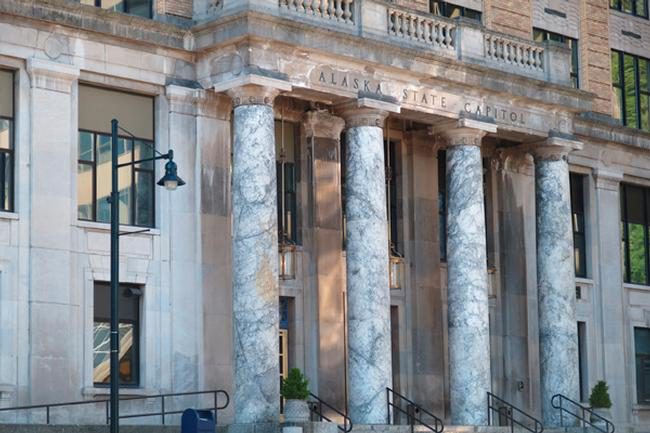


Latest news, alerts, and events.
Latest news, alerts, and events.

As part of our work as Alaska’s nonprofit association, Foraker pursues nonpartisan or bipartisan public policy initiatives with local, state, and federal governments. The first session of the 34th Alaska Legislature adjourned on May 20, 2025, and Foraker was actively involved with several key issues.
During the session, legislators had critical conversations about the importance of nonprofits in our state. Those conversations began with the first “Lunch and Learn” of the session, which featured a presentation on our report Alaska’s Nonprofit Sector: Generating Economic Impact, to comments at a hearing on the impact of federal funding on the sector. And importantly, several Foraker public policy priorities were introduced as legislation. Following is a summary of the legislative outcomes.
Prompt Payment Parity
For many years, Alaska nonprofits, municipalities, and tribal organizations have told us about the increased challenges caused by the materially long delays in state payments for essential services they perform – services that are authorized by the legislature. After many years of chasing late payments through almost every department of state government and attempting through a concurrent resolution with the Alaska Municipal League (AML) in the last session, Foraker and AML determined that legislation was the most effective way to fix the issue. A point-in-time survey was used to validate current hardships.
During this session, Representative Rebecca Himschoot and Senator Scott Kawasaki introduced companion bills—HB 133 and SB 129—aimed at addressing this issue. These bills seek to establish parity with private contractors in payment timelines and penalties for nonprofits, local governments, and tribal organizations doing work for the state. We are looking for the same statutory protections that exist for private firms on public infrastructure projects. House Bill 133 and SB 129 would ensure that both state and federal pass-through funds are disbursed promptly to nonprofits, local governments, and tribal organizations, ultimately benefiting the many communities they serve in the most efficient way through good government practice.
We are deeply grateful to the many nonprofit, municipal, and tribal leaders who testified in support of these legislative proposals as the bills worked their way through the committee process.
The good news is that lawmakers on both sides of the aisle overwhelmingly acknowledged that delayed payments are a serious problem, and this issue is now formally on record. The bills received bipartisan support and faced no opposition. In response, the state issued fiscal notes, as part of the legislative process, acknowledging that additional staffing, time, and resources would be required to implement the legislation—effectively validating the problem.
We will continue to advocate for prompt payment parity during the interim while addressing the fiscal notes and expect to make further progress, ending with the passage of prompt payment parity legislation in the next legislative session.
Wage Transparency
Foraker testified multiple times in support of SB 78 and companion bill HB 156 introduced by Senator Dunbar and Representative Mina in their respective chambers. Foraker’s stance remains focused on the larger issue of ensuring gender pay equity, acknowledging that wage transparency is an important tool for closing the well-documented gender pay gap in Alaska’s nonprofit sector.
As part of our public policy role to generate research and data in support of public policy change, Foraker will soon introduce an updated report on gender pay equity. The report includes pertinent data on gender pay within Alaska’s nonprofits and will be shared with the bill sponsors.
Nonprofit Property Tax Exemptions
The Alaska Constitution guarantees a tax exemption for charitable nonprofit organizations, which shows up primarily with respect to local sales taxes and local property taxes. In recent years, however, differing interpretations of this constitutional provision and associated state statute have resulted in some Alaska nonprofits being improperly assessed property taxes by local governments.
Fairness in taxation has been part of Foraker’s public policy priorities for well over a decade. We are actively working to clarify the statute to ensure that nonprofits receive the tax exemption to which they are constitutionally entitled. To that end, we are closely collaborating with the Alaska Municipal League to develop a mutually agreeable legislative solution.
While the legislation was not introduced this session, we have developed draft legislative language and, most importantly, have identified legislative champions to help advance this effort. Our aim is to have a draft bill ready for consideration when the legislative session reconvenes in January 2026.
Federal Funding Impacts
In addition to our legislative priorities, Foraker also served as a resource to the legislature as they continue to navigate changes in federal policy and funding. Foraker established a one-stop webpage in early January to track federal funding impacts and produced a detailed survey report about the devastating impacts a halt in federal funding would have on nonprofits and Alaskans. Our data on federal funding has proven invaluable as one of the few reliable sources of information on the scope and scale of federal funding impact. To that end, we testified several times at the legislature on this topic and provided timely interviews and public presentations at Rotary Clubs and Chambers of Commerce throughout the state. Our website and regular communication continue to be a trusted source of information. We are committed to this work for as long as the challenges present themselves.